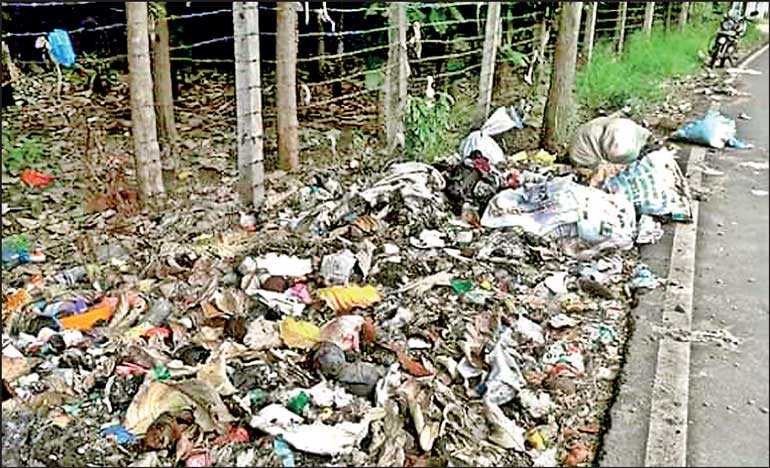Thursday Feb 19, 2026
Thursday Feb 19, 2026
Friday, 6 December 2019 00:00 - - {{hitsCtrl.values.hits}}

N. Lohathayalan
Reporting from Jaffna
As dengue returns in force, Jaffna District has moved to second place among the 25 districts affected by the disease, according to data from November 2019. The districts, in order of worst afflicted, are Colombo, Jaffna, Gampaha, Kalutara and Kandy.
Jaffna’s health authorities have been caught unprepared, without the stocks of fogging and spraying chemicals that prevent mosquito breeding and infestation.
In 2018, a total of 2,120 persons were stricken by the virus in Jaffna. This year, 3,350 have already been infected, three of them being fatalities. Residents report fewer visits to their homes by health inspectors doing spot checks. Major hospitals are hard-pressed to deal with the overflow of dengue patients, with 150 people forced to occupy a ward built for 45 patients in the Jaffna Teaching Hospital.
Jaffna Teaching Hospital Director Dr. T. Sathiamoorthy, informing the public of the state of the epidemic, noted that while 264 and 602 patients had been definitively diagnosed in November and December respectively last year, 1,549 have already been diagnosed in November in 2019. He imparted concern that these numbers will be further exceeded in December, whose first five days alone has seen 200 identified dengue cases.
The best way to control dengue is by guarding against it, said Dr. Sathiamoorthy, adding that this entails keeping the surroundings clean and free of stagnant water where mosquitoes can thrive, and by fogging and spraying the places in which they breed.
Jaffna District Secretary N. Vethanayahan has shown leadership by holding urgent meetings with the Department of Health, the Mayor of Jaffna, the Director of the Jaffna Hospital, the Director of Health Services and Secretaries of Pradeshiya Sabhas to strategise a way out of the crisis. Surprisingly, their first measure has been to order shut all tutories in Jaffna. These have been identified as extremely unsanitary and breeding mosquitoes, some having no toilet facilities at all.
The help of local authorities has been sorely needed to eradicate places of stagnant water, however, they have failed to take adequate action in removing rubbish heaps in the area.
At the same time, the onus has been put on residents to sort their refuse into categories. Additional charges imposed on households that produce excess refuse have led to the stealthy dumping of garbage at night-time on streets, which has then encouraged others to also dump garbage in the same spots and are left uncleared.
Although the Northern Province Health Ministry has declared 5,491 cases of dengue this year in the peninsula, caught unprepared, the cost for the anti-mosquito fogging equipment and chemicals has been passed onto local authorities.
“To end dengue, we need to eliminate mosquitoes. To finish off mosquitoes we need to go beyond municipalities and other local Government authorities, get together and work together,” said a member of the Municipal Council.